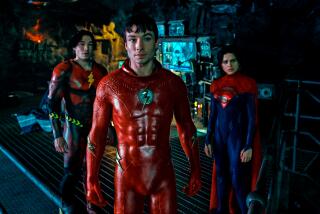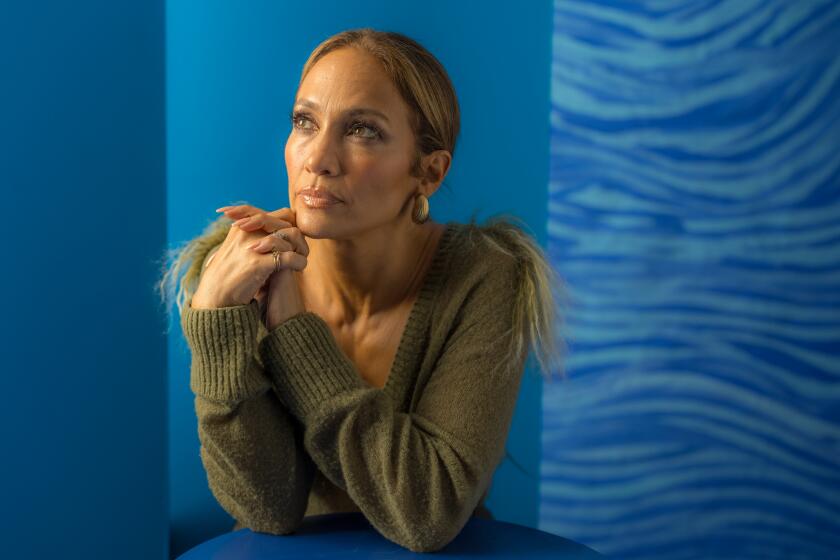Documentary probes the legacy of ‘Jew Suss’
Adolf Hitler wrote with dark clarity about propaganda. Its role, he stated in “Mein Kampf,” is “not to weigh and ponder the rights of different people, but exclusively to emphasize the one right which it has set out to argue for.”
No film ever embodied his warped charge that Jews violated the rights of the German people more viciously than a 1940 melodrama called “Jew Suss,” directed by Veit Harlan. Harlan employed his skills as one of Germany’s leading filmmakers — and cast his movie-star wife, Kristina Soderbaum — when he made the anti-Semitic tale of an 18th century Jewish court-advisor who assumes despotic powers, kills an Aryan beauty and gets killed by supposedly pure Germans.
Heinrich Himmler had Harlan’s “Jew Suss” shown to members of the SS. After its debut at the Venice Film Festival, in the fascist-dominated Italy of 1940, the film played to an estimated 22 million people across Europe. It was eventually shown to concentration camp guards to justify their killing.
The world has mostly forgotten this film, which remains banned in Germany. But it and its maker haunt three generations of Harlan offspring who talk openly (in most cases) about them in a new documentary called “Harlan: In the Shadow of Jew Suss,” which opens Friday at Laemmle’s Town Center 5 in Encino and Sunset 5 in West Hollywood.
Felix Moeller, the documentary’s director, says it remains rare for the offspring of Nazi-connected figures to face the past on camera. “For people making documentaries of this period, many children and grandchildren will not talk about what it means to be related to such a person,” Moeller explained, in an interview from Munich. “I know filmmakers who have a lot of trouble with this.”
How does he account for the relative candor he got from key Harlan offspring? One ice-breaker, he said, is that “they don’t see him as a top Nazi. He always claimed he was forced to make the film. Some in the family still cling to this.”
Moeller traversed Europe to film the descendants of two of Harlan’s three wives (he didn’t have children with the first), creating a complex weave of inter-generational views on how to absorb the memory of guilt.
Before the years when Harlan worked closely with Nazi propaganda minister Joseph Goebbels, he married for the first time to Dora Gerson, a Jewish actress who died in Auschwitz. His second wife, Hilde Korber, from whom he was divorced amid the rise of National Socialism, was a Catholic with close ties to the prewar Berlin Jewish community. The film portrays him as more of an opportunistic artist without a conscience than a Nazi ideologue, and takes on a note of savage irony when audiences learn that Harlan’s daughter by Korber married a Jewish man whose family was destroyed by the Nazis in Minsk.
Telling this intricate story, Moeller said, was eased by the fact that many in the Harlan clan work in the arts. There are exceptions, but self-expression seems to be a family trait. One son, Thomas, became a well-known novelist and filmmaker. He’s devoted himself to assailing what his father did, and is a strong presence in the film. Others resist Moeller’s questions.
To Jessica Jacoby, a granddaughter, Harlan was a war criminal. In an interview with The Times, she stated her dismay that her grandfather, the only cultural figure tried for Nazi war crimes for a work of art (“Jew Suss”), was acquitted after the war by a judge she and Moeller say had known Nazi sympathies.
“One thing written about postwar Germany is the way that so often no justice was done,” Jacoby said from Berlin, where she writes about film. “Nazis and Nazi perpetrators were protected, and there was my grandfather, the only artist who did go before a court. He should have had a severe sentence. Why wasn’t he convicted? Why didn’t he go to prison?”
Jacoby’s story is painfully complex. Her mother, Susanne, Harlan’s daughter by his second wife, married a Jewish journalist after the war. His parents — Jacoby’s Jewish grandparents — were killed by the Nazis.
Another figure in Moeller’s film is Christiane Kubrick, the widow of director Stanley Kubrick, who is Harlan’s niece. She describes difficult family occasions when Kubrick, who was Jewish, met the “Jew Suss” director, who died in 1964. But the subjects who embody most perplexingly the challenge of a progenitor’s tie to historical crimes are the youngest grandchildren — the children of the director’s younger children or later marriages of older ones — who struggle to understand their thin connection to “Jew Suss’” legacy.
At a recent New York screening of Moeller’s film, which he attended, a viewer argued that the documentary should contain more explicit Holocaust footage. Moeller stood and disagreed. He said that he and his producers determined that stock concentration camp scenes would numb viewers by locating them back in images that have become familiar. He said he wanted a film about how the impact of the Hitler era has evolved, to “test how memory does or does not last over time.”
More to Read
Only good movies
Get the Indie Focus newsletter, Mark Olsen's weekly guide to the world of cinema.
You may occasionally receive promotional content from the Los Angeles Times.








